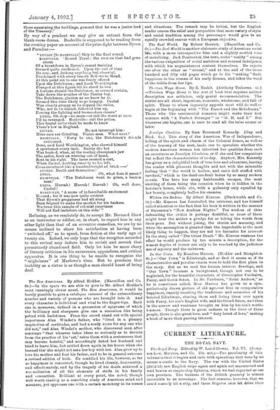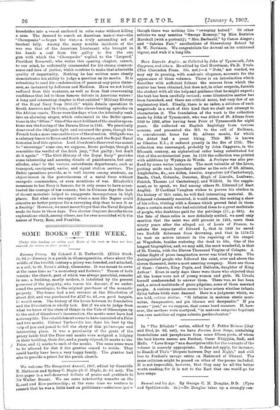CURRENT LITERAT URE.
THE ROYAL NAVY.
The Royal Navy. Edited by W. Laird Clowes. Vol. VI. (S imp- son Low, Marston, and Co. 259. net.)—The peculiarity of this volume is that it begins and ends with operations that were by no means a credit to the Navy. The war with the United States (1812-15) saw English ships again and again out-manoeuvred and well beaten at single-ship fighting, which we had regarded as our own province. The badness of the British gunnery is almost incredible to us nowadays. The fact remains, however, that we could scarcely hit a ship, and three frigates once let drive _their broadsides into a vessel anchored in calm water without killing a man. The demand to search an American man-o'-war—the ' Chesapeake' — began the war,—a truly astounding act of insolent folly. Among the many notable incidents of the war was that of the American Lieutenant who brought in his hands a coal from the galley to fire the one gun with which the Chesapeake' replied to the Leopard.' President Roosevelt, who writes this opening chapter, cannot, to our mind, be sufficiently commended for his strong common- sense and love of justice, which combine to make that admirable quality of impartiality. Nothing he has written more clearly demonstrates his ability to judge a question on its merits. It is refreshing to read his condemnation of peace-at-any-price states- men, as instanced by Jefferson and Madison. Have we not lately suffered from this weakness, as well as from that overweening confidence that led to those famous defeats in American waters ? A long and interesting chapter is that entitled " Military History of the Royal Navy from 1816-56," which details operations in South America and in China, and the slaver-hunting episodes on the African coasts. Those were the days when the Admiralty sank into an alarming stupor, which culminated in the Baltic opera- tions in the "fifties." One of the most brilliant of the smaller opera- Cons was the forcing of the Parana River in 1845. We practically disavowed the Obliged° fight and returned the guns, though the French took a more reasonable view of the situation. Obliged° was a salutary lesson to Roses and South America, and the Royal Naval historian is of this opinion. Lord Aberdeen's disavowal was meant to " encourage" some one, we suppose, Roses perhaps, though it resembles the verdict of the Irish jury, " Not guilty ; but don't do it again." "The Civil History of the Royal Navy" provides some interesting and amusing details of punishments, but only alludes, alas ! to the various subordinate departments, such as transport, coastguard, excise, and signal station services. The Baltic operations provide, as is well known among students, an object-lesson in the powerlessness of a naval force without energetic commanders, or even munitions of war. Elizabeth's meanness to her Navy is famous, for it only seems to have accen- tuated the courage of her seamen ; but in Crimean days the lack of decent materials helped to exaggerate incompetence in high places. But what can one expect when a man like Napier could conceive no better purpose for a surveying ship than to use it as a fireship ! However, we must never forget that the Naval Brigade made its fame in those days. Two shorter chapters describe those explorations which, among others, are for ever associated with the names of Parry, Ross, and Franklin.







































 Previous page
Previous page